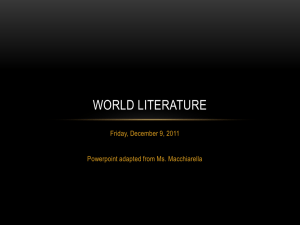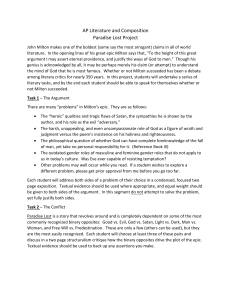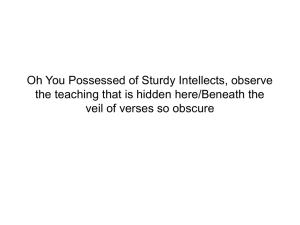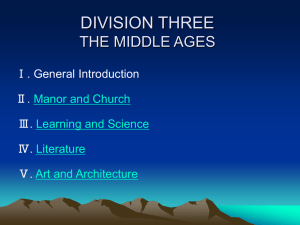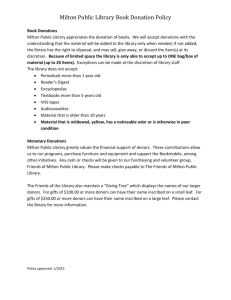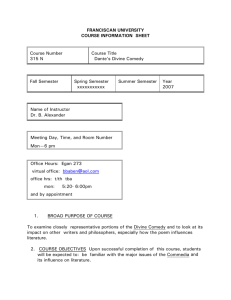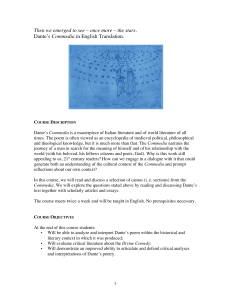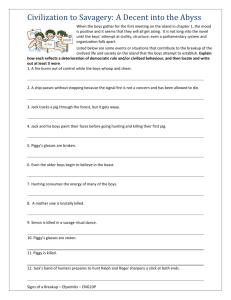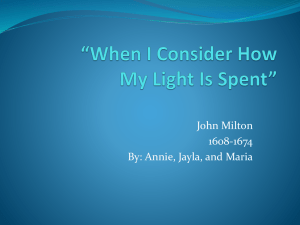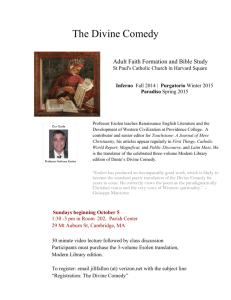English - Minot State University
advertisement
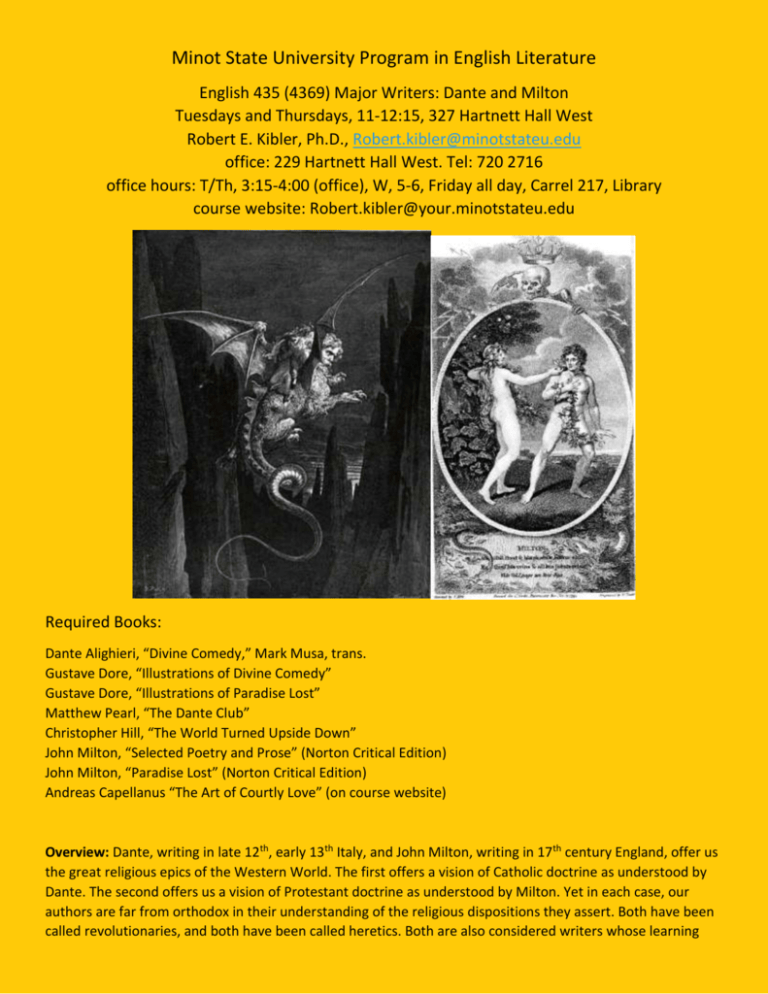
Minot State University Program in English Literature English 435 (4369) Major Writers: Dante and Milton Tuesdays and Thursdays, 11-12:15, 327 Hartnett Hall West Robert E. Kibler, Ph.D., Robert.kibler@minotstateu.edu office: 229 Hartnett Hall West. Tel: 720 2716 office hours: T/Th, 3:15-4:00 (office), W, 5-6, Friday all day, Carrel 217, Library course website: Robert.kibler@your.minotstateu.edu Required Books: Dante Alighieri, “Divine Comedy,” Mark Musa, trans. Gustave Dore, “Illustrations of Divine Comedy” Gustave Dore, “Illustrations of Paradise Lost” Matthew Pearl, “The Dante Club” Christopher Hill, “The World Turned Upside Down” John Milton, “Selected Poetry and Prose” (Norton Critical Edition) John Milton, “Paradise Lost” (Norton Critical Edition) Andreas Capellanus “The Art of Courtly Love” (on course website) Overview: Dante, writing in late 12th, early 13th Italy, and John Milton, writing in 17th century England, offer us the great religious epics of the Western World. The first offers a vision of Catholic doctrine as understood by Dante. The second offers us a vision of Protestant doctrine as understood by Milton. Yet in each case, our authors are far from orthodox in their understanding of the religious dispositions they assert. Both have been called revolutionaries, and both have been called heretics. Both are also considered writers whose learning encompassed everything there was to know in their time, so to study them is to enter a vast gateway to human knowledge and received truth. This term our goal will be to read these writers, understand them in their historic and literary context, and both relate to them and criticize them as we can from our own historic and cultural perch of 2015 in America, a place Dante never knew about and Milton only vaguely understood. Expect daily quizzes, and be ready to both discuss in class and provide two thoughtful discussion questions per class. You will also write two five paged essays, one for Dante and one for Milton, seeking answers, perhaps, to your own discussion questions. Our pace will be moderately swift, covering 9 cantos per week for Dante, and four cantos per week for Milton. The goal is to get these important works read, known, and considered-not to crack the cosmic egg of Dantescan or Miltonian studies. Here then is a breakdown of the course work: Daily quizzes on dates, literary figures, storyline: 25% Discussion and discussion questions: 25% (four grades per term—two for Dante, two for Milton) Two five page essays: 50% Expect that each day I will share one or two important literary or historic observances about our reading, after which we will depend on free wheeling discussion. Syllabus our syllabus is a rough map that serves as a general guide to the order and scope of our work, not an absolute one. Week I 13-15 January Introductions, Courtly Love, Arthurian Legend, Bon amor, fin amor, the French troubadours, history of Florence, Dante’s Tuscan contemporaries. Week 2 20-22 Jan Read “La Vita Nuova.” Week 3 27-29 Jan Inferno, cantos 1-20 Week 4, 3-5 February Inferno, cantos 21-34 Purgatorio, cantos 1-10 discussion and submitted question evaluation #1 Week 5, 10-12 Feb Purgatorio, cantos 11-33 Week 6, 17-19 Feb Paradiso, cantos 1-20 Week 7, 24-26 Feb Paradiso, cantos 21-33 Week 8, 3-5 March Read “The Dante Club” discussion and submitted question evaluation #2 Week 9, 10-12 Mar Read Christopher Hill’s “The World Turned Upside Down” Spring Break 17-18 March Week 10, 24-26 March Read Lycidas, The Doctrine of Discipline and Divorce, Of Education Read: “The Tenure of Kings and Magistrates, Areopagitica Week 11, 31 March, 2 April Read “The Redy and Easy Way to Establish a Commonwealth” Read “Paradise Lost, books 1-2 discussion and submitted question evaluation #3 Week 12, 7-9 April Paradise Lost, books 3-6 Week 13, 14-16 April Paradise Lost, books 7-10 Week 14, 21-23 April Paradise Lost, books 11-12 discussion and submitted question evaluation #4 Week 15, 28-30 April reviews Week 16, 5-7 May reviews
